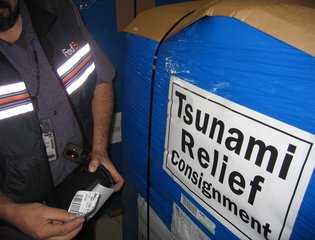I was only three months into my job at an international NGO and fresh from the corporate world when I was deployed to Antique, one of the provinces severely affected by Typhoon Fengshen (locally named Frank) in 2008. It was a baptism of fire. I remember standing on the porch of what had been a house before it was swept away by the raging river. Surely, I thought, there must have been a way to mitigate the damage done to lives and livelihoods on that day.
Just as I have changed roles since 2008 – from being a frontline worker to being an evaluator and researcher – humanitarian response in the Philippines has also changed. Pivotal lessons were learned from devastating disasters such as Typhoon Haiyan, prompting changes in the delivery of much needed aid to affected populations.
However, the Philippines – the most disaster-prone country in the world according to the World Risk Report 2022 – faces daunting challenges. Extreme events and climate-related disasters have grown more complex and unpredictable over the years, presenting an increasing threat to the lives and livelihoods of Filipinos across the country.
I recently attended the 2022 State of the Humanitarian System Report presentation co-organised by the Center for Disaster Preparedness (CDP), Oxfam Philippines and ALNAP in Manila. Representatives from the government, civil society, academia and the private sector gathered together to talk about the opportunities and challenges for the humanitarian system in the country. Here are some of the highlights of the discussion.
- Priming for anticipatory action
Shifts towards anticipatory action and disaster risk reduction are ongoing, with efforts being initiated by different stakeholders:
- The Philippine government highlighted a paradigm shift towards prevention and mitigation with the revision of the NDRRM plan, the establishment of logistics hubs for prepositioning goods, and efforts to develop the capacity of local governments to respond to disasters.
- The CSO sector is piloting anticipatory action in communities, with some organisations distributing cash cards to community members to facilitate the disbursement of cash in preparation for disasters and encouraging local complementation of funds.
- The University of the Philippines Resilience Institute (UPRI) is working with the Climate Change Commission, the Philippine government’s policy-making body on climate change, to come up with climate change impact scenarios to inform anticipatory action using probabilistic risk assessments.
- The Philippine Disaster Resilience Foundation (PDRF), the Philippines’ primary private sector coordinator for disaster risk and reduction management, has an extensive business continuity programme for micro, small and medium enterprises (MSMEs) nationwide to help small businesses prepare for disasters. In 2017 it established the first private sector-led Emergency Operations Center in the region; the Center monitors hazards, coordinates early action and emergency services integration, and promotes disaster resilience among businesses.
Necessary investments in anticipatory action at the local level are still lacking, meaning that donors and funders have to rethink their policies and ways of working. Adopting adaptive management and flexibility around funding use enables local aid actors to mobilise resources based on needs in the local context.
"Instead of having fixed or boxed programmes, adaptive management could help support further anticipatory action. Then again this will entail a bit of a paradigm shift among donor agencies to be flexible with regard to how the programmes are listed based on agreed contracts but allow flexibility to use resources based on needs arising from the local context."
Edwin Salonga, Country Program Manager for the Philippines, Asian Disaster Preparedness Center
2. Walking the talk on locally led humanitarian action
The buzz around localisation has been building for some time, but the humanitarian system’s rhetoric remains largely international. The role of local humanitarian actors and communities in disaster response cannot be overstated; they are often among the first to respond. This was evident during the Covid-19 pandemic in the efforts of local CSOs and the private sector. But while the pandemic brought to the fore the essential role of local actors in responding to the pressing needs of affected people, momentum continues to be slow because of the limited proof of concept of its effectiveness and impact.
The push for locally led humanitarian action necessitates major shifts, but local civil society organisations raised critical questions about whether the humanitarian system is ready to make this shift towards locally led humanitarian action, and whether international NGOs and donors trust local CSOs and NGOs enough to hand over the reins. Local CSOs continue to face significant barriers in advancing locally led humanitarian action because of limitations in resources and capacity. For instance, the CDP spoke of the cumbersome and time-consuming processes and requirements that local CSOs must go through to access funds from international donors - processes that often require technical expertise and technological know-how that local actors may not possess.
"The CSO sector is very much willing to give our time... but we must also ask how much time can international organisations give to adjust to localisation? Their tons of due diligence are really nerve-wracking. As a national CSO we tried to absorb the due diligence of our local partners. For adjustments, we are very much willing. We are also hoping for INGOs to be willing as well to give more effort and time, because the adjustment will be more on their side to soften the system."
Mayfourth Luneta, Deputy Executive Director, Center for Disaster Preparedness
3. Advancing inclusion and the meaningful participation of community stakeholders in humanitarian action
"I have been hearing the word 'inclusive' every now and then, but what [is lacking] is disability inclusion. We are talking about 'no one left behind', but we are always not including persons with disabilities or their organisations. There has to be a disability inclusion policy. The disability sector is always the first to be forgotten and the last to be remembered."
Arthur Letim, CBM Global Philippines
Efforts promoting community-based disaster risk reduction and management (CBDRRM) have always been strong in the Philippines, with organisations such as CDP working with public and private stakeholders to push for inclusivity. However, challenges remain around the inclusion of vulnerable and marginalised groups in disaster preparedness and response processes.
Strengthening DRM processes necessitates breaking down the barriers that prevent community stakeholder groups having safe access to seats on local and national DRRM councils. This means ensuring that the voices of affected populations – including vulnerable groups – are heard and amplified, that their needs and priorities are considered and addressed, and that they are empowered to make informed decisions on matters that affect them, including in disaster preparedness, response and mitigation.
It has been nearly 15 years since I embarked on my journey as a humanitarian worker in the Philippines. I have seen significant improvements in humanitarian response, including: the use of cash and voucher systems; pre-packed kits that consider the needs of different family members; and more local governments becoming more adept at preparedness and response.
Listening to stakeholders' and participants’ insights at the State of the Humanitarian System presentation made me ponder what further shifts need to take place, not only to improve the efficacy of humanitarian response but also to push for increased preparedness and mitigation. In the end, I think the litmus test of change in the system is a real shift in power, resources and decision-making: a shift that breaks down barriers and empowers local humanitarian organisations and communities to take the lead.
"It is still a long way to go, whether we like it or not. But we are not giving up in pursuing change in the system. This is our life; we are here already. Let us hold on to the positive developments and strengths that were shared with us and identified in the report. It would serve as our anchor to really shift the power and decolonise aid so that localisation can move forward."
Loreine de la Cruz, CDP Executive Director

